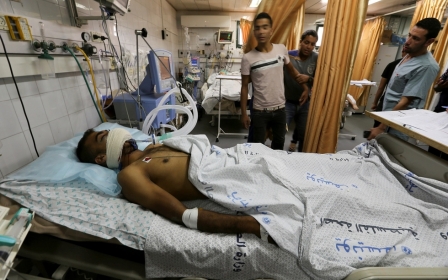Palestinian dies of wounds from Gaza border protest: Ministry

A Palestinian shot by Israeli forces last month during protests on the Gaza border has died of his wounds, the health ministry in the Hamas-ruled territory said late on Wednesday.
"Mohammed Ghassan Abu Daqqa died... on Wednesday evening from his wounds, after he was shot by the Israeli occupation east of Khan Younis on 14 May," the ministry said.
It described him as a "young man" but did not give his precise age.
At least 133 Palestinians have been killed since mass protests broke out along the Gaza border on 30 March.
No Israelis have been killed.
The protests peaked on 14 May when at least 62 Palestinians were killed as thousands gathered near the heavily guarded border fence on the same day the United States moved its embassy in Israel from Tel Aviv to Jerusalem.
Israel says its use of live fire is necessary to defend its borders and stop infiltrations.
On Wednesday, Prime Minister Benjamin Netanyahu warned Israel could step up its "intensity" of attacks on Gaza, after a new flare-up that saw Israel carrying out air strikes and Palestinians launching rockets and mortar shells.
Israeli planes initially targeted three Hamas military positions overnight in Gaza on Wednesday in response to kites and balloons carrying incendiary and explosive devices launched into Israel from the Palestinian territory, the army said.
"Hamas and other terrorists, but mainly Hamas" hit back after the first air raids with more than 45 rockets and mortar rounds fired from Gaza towards Israel, seven of which were intercepted by the Iron Dome missile defence system, Israeli military spokesman Jonathan Conricus said.
Stay informed with MEE's newsletters
Sign up to get the latest alerts, insights and analysis, starting with Turkey Unpacked
Middle East Eye delivers independent and unrivalled coverage and analysis of the Middle East, North Africa and beyond. To learn more about republishing this content and the associated fees, please fill out this form. More about MEE can be found here.




